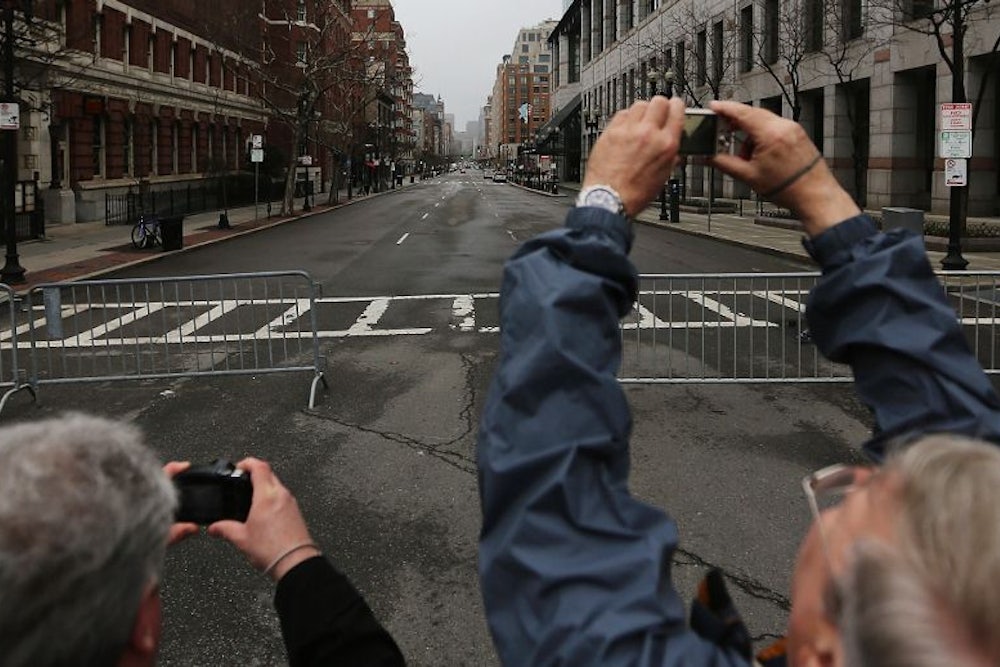Almost as soon as the bombs exploded on Boylston Street the calls were heard to move on. “Repair the sidewalk immediately,” exhorted one commentator, “fix the windows, fill the holes, and leave no trace—no shrines, no flowers, no statues, no plaques—and return life to normal there as fast as possible.” Anything less would be a victory for the terrorists, who should not be allowed, as if it is within our power to disallow it, to leave “even the smallest scar” on our cities and our psyches. “The best response to a tragedy such as the one in Boston,” declared another commentator, “is to go on with your life, eyes open.” The advice was perfectly anodyne—but who, except the victims of the atrocity, was preparing to do anything else? A security expert pronounced that “this is a singular event, and not something that should drive policy.” His certainty that there was nothing to be learned from the attack was expressed long before we learned very much about the attack. There was a lot of uplift, too, in the discussion of the horror, which was understandable, since there is nothing as comforting as cliché; but it seemed similarly panicked by the prospect of a rupture in quotidian American existence, of a disruption in the inertia of a good life. Some of this silly balm consisted in local chauvinism: suddenly everybody was singing the Standells. “They picked the wrong city,” President Obama said, along with many others. Which city would have been the right city? He also proclaimed proudly that “Americans refuse to be terrorized.” But Americans were terrorized, on the day of the bombing and on the day of the manhunt; and they were right to be terrorized, because what they had in their midst was terrorism.
Moving on is of course one of the quintessential expressions of the American spirit, and of the American shallowness. Our religion is the religion of movement; stillness offends our sense of possibility. We dodge the darker emotions by making ourselves into a moving target for them. We feel, but swiftly. This emotional efficiency, this cost-benefit calculus of the heart, is at once a strength and a weakness: you cannot be damaged by what cannot sink in. And so we acquire resilience through transience, and stoicism through speed. We cling desperately to the illusion of our immunity, even after it has just been disproved by experience, and to the fiction of the pastness of the past: we call it “closure,” which is just a decision not to care anymore, and not to let experience intrude any further. We need desperately to know that our insulation is intact. Hence the haste to get the marathon massacre behind us, to hold the memorial service and plan the next marathon. We are sometimes so anxious not to overreact that we underreact. Perhaps some people worried, in the aftermath of the Boston bombings, that if we lingered too long over the outrageous fact of what had been done to us, if we were patient with fear and tolerant with anger, then we, I mean our government, might be tempted to do something, and some airborne division might be dispatched for some more shock and awe. After all, if any past is not past, it is 2003. (The worry is plainly ridiculous, as our government prefers highly analytical inaction.) In any event, we decided that every detail of our lives before the bombings was now sacred. Americans do not like to be inconvenienced by history. We sometimes comport ourselves as if history is itself an inconvenience.
I remember reading these vicious lines by Frank Bidart, in 2002 in The Threepenny Review, in a poem called “Curse” about the terrorists of September 11:
May what you have made descend upon you.
May the listening ears of your victims their eyes their
breath
enter you, and eat like acid
the bubble of rectitude that allowed you breath.
I greatly admired their wrath. Sometimes anger is apposite, a sign that you have accurately understood what has befallen you; and the absence of anger a sign of intellectual or moral confusion. Most of the curses I heard during the week of Boston’s ordeal were directed at the allegedly heavy hand of law enforcement! The same with fear: it may have a basis in reality, and when it does it should be respected. Sometimes it is fearlessness that is unintelligent, and its consequences are not always laudable.
Only a stupid society would come away from the events in Boston with its sense of its security unshaken. Only a stupid society would refuse to acknowledge that its safety, and its peace of mind, may be affected by resentments and metaphysics that come from far away—from what Fouad Ajami recently described, in connection with the Tsarnaev brothers, as “the seam between countries and cultures.” Even though we must harbor no fantasy of invulnerability, we must not be glib about our vulnerabilities. Keep calm and carry on, sure—but also think strategically, and make adjustments, and learn lessons. Are there really no policy conclusions to be drawn from Boston? I do not believe it. The professors of risk, who peddle reassuring probabilities and are more anguished about whether cigarettes should be seen in the stores that sell them, measure evils only quantitatively, which has a certain consciousness-lowering effect.
Vigilance, increased and intense, is not a victory for the terrorists. Mourning, and the time it takes, is not a victory for the terrorists. Reflection on all the meanings and the implications—on the fragility of our lives—on terrorism and theodicy—is not a victory for the terrorists. A less than wholly sunny and pragmatic view of the world is not a victory for the terrorists. What happened on Boylston Street was not a common event, but it was not a singular event. There is a scar. Taking terrorism seriously is not a victory for terrorism.
